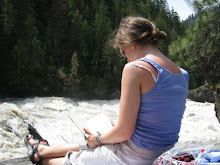An either/or question: Are you an optimist or a pessimist?
Immediately, pessimist is ruled out. I try to find the good in life, people and shitty situations. Yet it feels naive to declare myself an optimist. The world has so many dark aspects (most of which I am lucky to have never encountered) that blatant optimism feels like a luxury of the uninformed.
Yet today I am feeling grateful.
I am grateful that is it 70˚ and brilliantly sunny. I am grateful that I am a 5 minute drive from beautiful, uncrowded trails that wind through pine forests. I am grateful for a strong (enough) body that does what I ask it to without complaint. I am grateful to have the luxury of taking a morning for myself to just
be in the outdoors.
I am grateful for my new veggie garden, however lopsided and unproductive it may be. I am grateful for my cute lil' Swedish roommate who gardens with me (in her pink polka dot gloves). I am grateful for all the other amazing, intriguing people I seem to continually meet all across Missoula. I am feeling so thankful I even have fuzzy feelings for my cranky neighbor who yells at me for turning my car around on his property.
I am grateful to live in a country where I have the opportunity to be in college. I am grateful to be studying something in school that I am passionate and genuinely interested in. I am grateful for clean water flowing from my faucet and good food in my fridge. I am grateful for a community that values sustainable agriculture, local farmers, slow food and backyard gardens.
I am grateful for my parents and the way they raised me. I am grateful for all the doctors, nurses, researchers, and community members who have ensured Dad gets another spring on his mountain bike and summer on the river. I am grateful to answer a phone call from home without my stomach tying into knots. I am grateful that I have a younger brother who is growing up to be a funny, intelligent, genuinely interesting person (and can have a half hour phone conversation without being painfully awkward).
I know, I know, I sound like a cheesy Hallmark Channel movie. But when I go outside, listen to the birds chirping, feel the sun on my bare shoulders and take a whiff of that beautiful, wild, warm, vibrant, SPRING smell I can't help but realize... whether half empty or half full, there is water in the glass. And on a day like today, that is all that matters.


